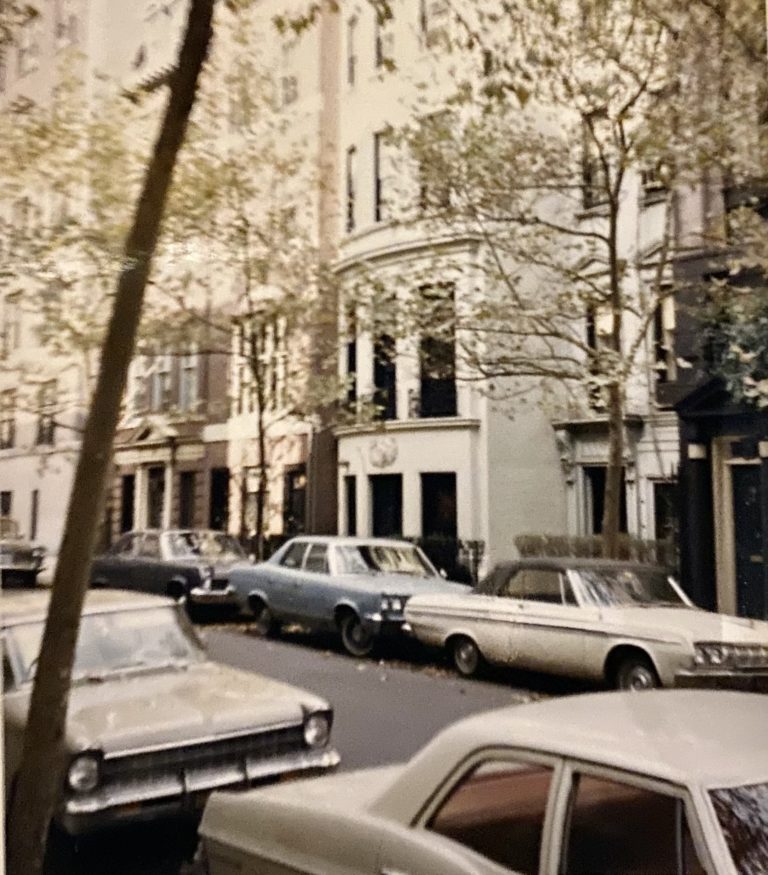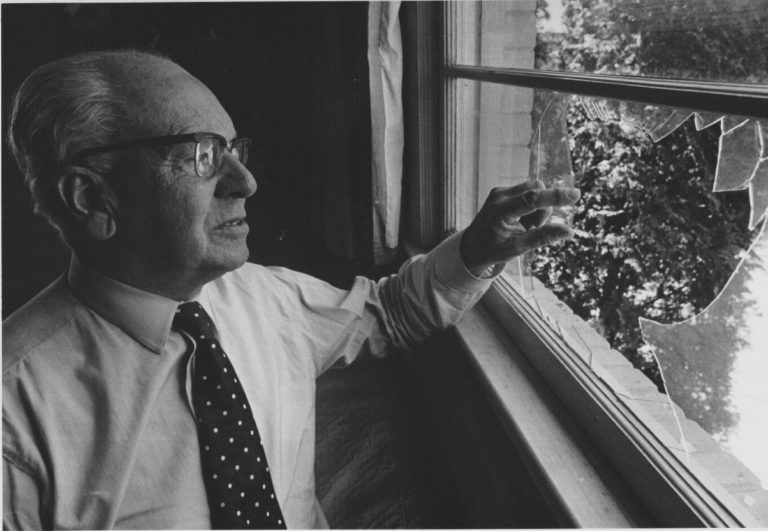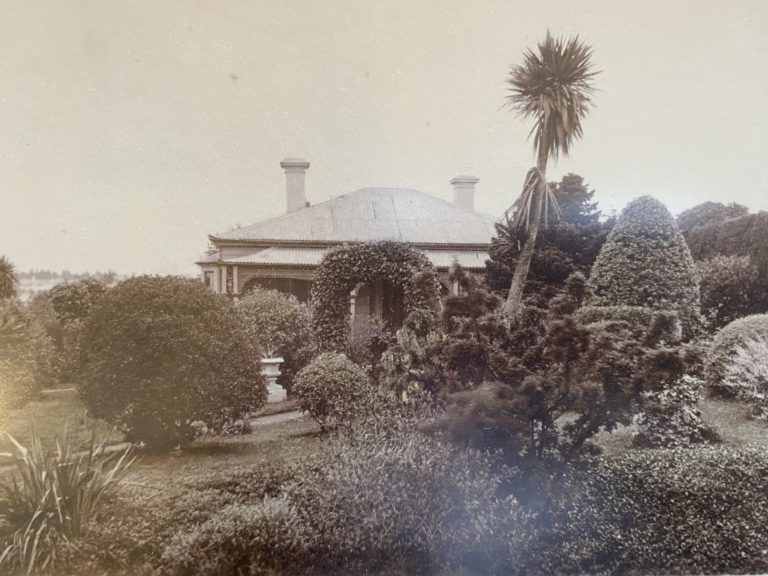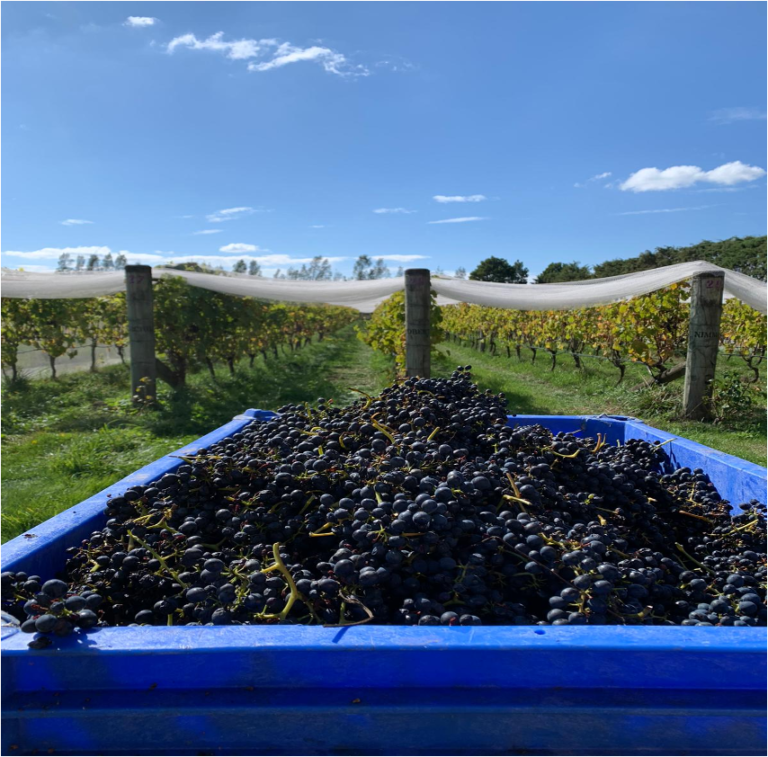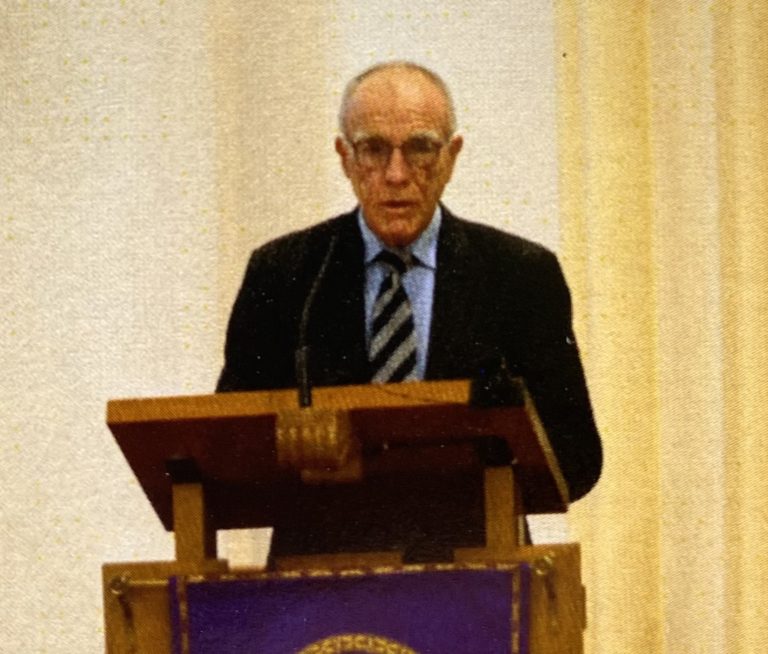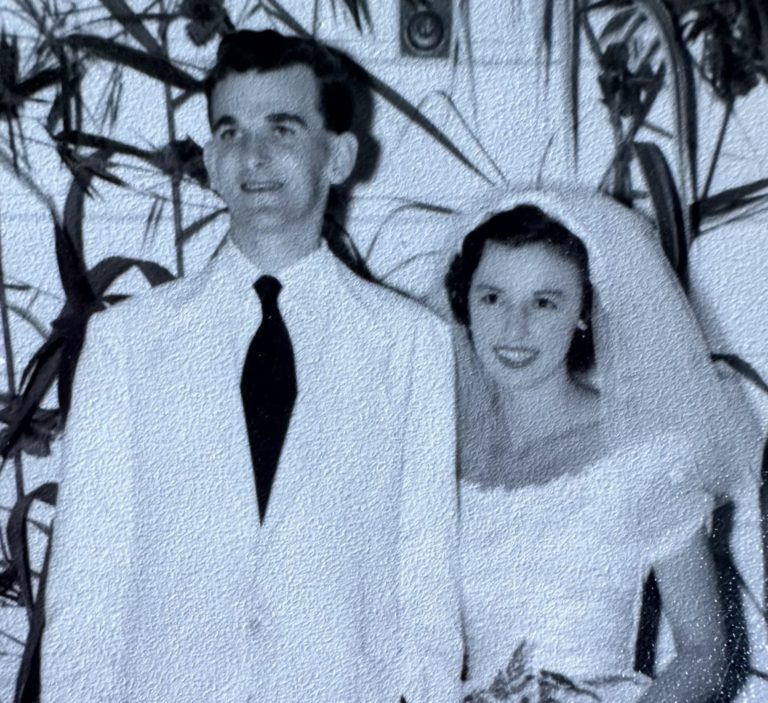Growing Up
‘Love, still a baby on his mother’s knee, Diced for my soul, and won it casually.‘ Meleager of Gadara
Anyone starting secondary school in 1948 found it a leisurely process. An epidemic of polio, from which there was then no protection, kept all schools closed for several weeks past their opening date. A conscientious Education Department sent us correspondence school courses to work on in the meantime. I looked with some disquiet on the maths papers, felt guilty about not working on them and then was relieved when school finally got under way to find that no-one else had either.
After some discussion between my parents, my mother’s preference had prevailed and I went to St Bede’s College. This was a four-mile bike ride from my home and because it was in the north had an unfortunate meteorological peculiarity – the gusty nor-wester that headed me when I left for school would swing round and become a sou-wester to battle against coming home. Apart from this inconvenience, an eight-mile journey every school day over five years must have done me a considerable good.
St Bede’s gave me the sort of sound education now admired in faith schools, in all the familiar subjects together with Latin and Christian Doctrine which has left me with an unexpected knowledge of the councils of the Church, the ethics of St Thomas Aquinas and the calendar of the saints. The black hole was mathematics where my absences from asthma proved irrecoverable. Losing a lesson in English or History was barely noticeable but if I was away for a week everyone would have mastered some basic step in algebra or geometry which I could never replace. My personal best was set in the fourth form where my exam mark was 29. I was later to abandon Philosophy after a year at university when I discovered with horror that a sort of algebra called symbolic logic had been smuggled in to join the more congenial Hume and Kant.
The most interesting thing that happened in my first year was being called aside at morning assembly by the rector, John Dowling, to be asked whether I would like to take part in a radio programme called the Quiz Kids. I was twelve and my parents debated the propriety of this but my mother’s sense of fun prevailed and I was selected as one of five children from local schools to take part in the Christchurch end of a nation-wide radio programme.
We sat at desks on the stage of the Avon theatre every evening for a week. Each in turn would be asked a general knowledge question by the compere, Jack Maybury, a seasoned figure on commercial radio. If you couldn’t answer the question went to the group as a whole. If the answer given was wrong then we lost a point. In the course of the programmes we went on to do battle with other teams and finally each year a North Island-South Island contest. For this we received a pound note for each appearance, the equivalent of $60 in current money and no mean reward for a teenager, but for victories we could get five and as much as ten pounds each and my account at the Post Office Savings Bank even at the miserly interest of two and a half percent was encouragingly fattened over the years of the show.
My father’s caution was perhaps justified by the embarrassing publicity photos which showed us all sitting in gowns and mortar-boards. It is possible that we even wore the mortar-boards on the stage but if so they quickly became one of the show’s props, like the introductory music and spiel, and the embarrassment wore off. Seats in the theatre were sold for each session and when we were waiting to come on someone quickly found a gap in the curtain from which we could gauge the size of the audience. They followed the questions with a keen interest, with sighs of regret when we missed a key point and enthusiastic clapping when we got one right, giving us a taste of the dangerous pleasures of public applause.
After the show parents might join us backstage. The father of my very bright colleague from Boys’ High was the Hon. Angus McLagan, Minister of Labour. He was a rather dour Scottish trade unionist referred to privately by his son as Ungus McFungus. The wary handshake exchanged on these occasions by our fathers was more tense than anything to be seen on stage.
The show lasted the usual length of these novelties, three years I think, and when it was over we all went back to school life without any withdrawal symptoms. Years later I was travelling by rail from Picton to Christchurch on a train which, slow at the best of times, stopped occasionally in the middle of nowhere to catch its breath. On the third of these occasions someone in the carriage asked why we were stopping. A voice at the other end of the carriage said, “I think we need to take on more hay” and I recognised the voice of Barbara Harrison, a Quiz Kid colleague who was always good with an answer.
School life went on for five otherwise uneventful years. The classroom was rarely thrilling but always tolerable, except in my case woodwork. The government which was anxious to foster the arts also thought it necessary to foster the practicalities of life, and so woodwork was enjoined for boys and cooking for girls. In many cases including mine it would have been more useful if we had done cooking. No Hensley, even my grandfather who had a timber business, had ever been good at carpentry. I elected to make a bookshelf and one afternoon a week planed away in a mist of boredom. By the end of the term the rimu plank had become rather thin but no bookshelf ever eventuated.
Boys’ schools have an overriding interest in sport, from which my asthma excluded me, so I spent much of my time literally on the sidelines. Rugby victories were celebrated and losses explained away, classroom incidents came and went. One master was tormented, for no reason that I can remember, by a mysterious shuffling of feet that started as a faint sound at the back and grew to a crescendo in which we were all stamping noisily on the floor before dying away to nothing. Another demonstrated that threats were not needed to establish mastery over a class. When newly-arrived he faced the traditional challenge which would decide forever how he would manage in class. He asked a question and the boy replied rather cheekily that he could not answer because he was sitting on his book. Ah, said the new man, “You are wise to keep your books close to your brains”. He had no more trouble.
Towards the end of my time I started a school newspaper. It was called Look and consisted of several mimeographed sheets which appeared whenever the editor was able to get enough material. Because I was preparing for the university scholarship exams, Father Maurice Dowling lent me his study and also the use of his elderly typewriter on which I could cut the stencils for the paper. Maurice taught me not only French but more lasting advice such as, “When you open a bottle of wine, throw the cork out the door”. I sat in his upstairs room most mornings, sometimes studying and sometimes preparing for the next edition.
Running a school newspaper had certain similarities with running a samizdat publication in Moscow or Beijing. The editor had to keep the possibility of censorship always in mind, though there were no rules and no definition of what was not permissible. Looking back on it, the school seems to have been very tolerant and I remember trouble over only one issue. But the fact was that, like many in their last year, I had become bored with school and was testing its boundaries, restlessly thinking of new surroundings like a bird before migrating.
University life at Canterbury University College (then part of the notional University of New Zealand) was a dramatic change. It was not just the flattery for a 17 year-old being addressed as Mr Hensley, nor the freedom from days of being summoned by bells, it was the excitement of being among very knowledgeable people who were willing and indeed anxious to impart their knowledge to you. I sat spellbound through Professor Neville Phillips’ inaugural history lecture declaring that history demonstrates the full stretch of human potentialities, from heroism to evil, and felt that after years at school I was at last getting to the heart of things.
Among the certainties that this overturned was my intention to take a law degree and follow my father into his practice. The appeal of arts subjects first led to the decision to do a double degree in both arts and law and then, after majoring in English and History, to abandon any thought of the law altogether and take an M.A. in history. This meant that my father would have no successor in his law firm. He himself had a vocation for the law, never thought of doing anything else and claimed that he had given his first legal opinion at the age of seven, when a classmate asked, “Could a Christian say ‘bum’”, though regrettably he could not recall the opinion he gave. My defection must have been a considerable blow but I have always been grateful for his generous response, simply saying it was best for me to follow my inclination.
University clubs were part of social life. There was a vague expectation that I would join the Debating Club as a preparation for life in government and possibly politics but I never had the ready vocabulary for public speaking, finding that my thoughts came out better on paper than in the tumble of speech. Instead I joined the staff of the university newspaper, Canta, first as sub-editor and then as a contributor, writing a column on foreign affairs. Subbing involved not only learning to do layout but also sorting through the surprisingly wide range of contributors. They ranged from the sometimes pornographic to the earnestly Stalinist, for Stalin had just died and Soviet communism still carried a high intellectual charge. I discarded a sizeable amount of this, not (I hope) because of ideological disapproval but because most of it was repetitive and dull.
Drama was also a brief interest, though I had no desire or ability to act, but because Ngaio Marsh the author was still in her shining but brief period producing Shakespeare at the university. Her intuition, novel at least in Christchurch, was to set a play not in modern dress but in the clothes of the period she felt best suited it, for example sombre and introspective Byronic black for Hamlet. The first production I saw was Julius Caesar which she set in Fascist Rome in the thirties, with Casca and others in jack-booted uniforms and Caesar (later a colleague of mine in the foreign service) as a Mussolini in a flowing cape. It turned the play from a story of the overthrow of Caesar to a deeper meditation on the fragility of political order.
It was fascinating seeing Ngaio in action – intense, moody and snobbish – and the endless flow of little instructions from which her concept of the play gradually emerged. Having no dramatic ability I hung about on the edges, doing errands and joining in discussions until my level of ability was rewarded by putting me in charge of the background music and effects like thunder. The music was recorded and my challenge was to drop the needle in the right groove at the right moment; thunder was a piece of corrugated iron with a wooden handle. The production was for a week in the university Great Hall. I looked down on it every night from a tiny gallery half-way along the wall, working the sound system and rattling the iron. Some in the audience were kind enough to say that they had never heard thunder like it.
That was in my second year which was also memorable for a drama which rocked Christchurch. On a Saturday afternoon Henry Hulme, the Rector of the university, was playing in a doubles match at one of our tennis parties at home. To avoid breaking up the game I was despatched to pick up his daughter from a movie theatre. I took my father’s cream convertible, itself rather dashing for an- eighteen year –old, and picked up Juliet and her friend Pauline Parker to bring them back to our house. They got into the back seat but my attempts at conversation met with total silence; they were completely absorbed in one another, something I had never encountered before.
Two or three weeks later they murdered Pauline’s mother in the course of a walk in Victoria Park on Cashmere Hills, using a brick wrapped in a stocking to beat her to death. Hilda Hulme, Henry’s steamy but tough-minded wife, immediately destroyed Juliet’s copious diaries but even so there was ample evidence that they had plotted to kill their mothers from a fear that they were going to be separated.
The outcome of their trial was never in doubt but everyone, even in the court, was affected by the wrenching difference between the two fifteen-year-old girls in the dock (Juliet was a year or so behind my wife at school) and the cold-blooded horror of the crime. My father got me into the court on the last day of the trial, sitting in the old grand jury box half-way between the judge and the counsel. The Crown Prosecutor, Alan Brown, rising to speak before they were sentenced broke down and wept, being comforted both by the judge and by counsel for the defence. Not surprisingly the Hulme marriage also broke down. Hilda ran away with a Mr Perry who my father had introduced into their house, and Henry went back to his job as a nuclear physicist in England. Juliet, under the name of Anne Perry, went on to make a successful career as a writer of crime novels.
The end of the year brought a different outlook. In the long vacation over Christmas everyone supplemented their income and extended their knowledge of the world by taking a temporary job for several weeks. These, especially labouring work for boys, were plentiful. I spent some time in heavy fumes, cleaning out two of the petrol storage tanks at Lyttelton but most vacations were spent in woolstores there, compressing two bales into a tight wire-strapped single before sending them down to the waiting ship. There was no automation of any sort and shifting the heavy bales around on a trolley was arduous work. I acquired a varied but mainly left-wing vocabulary and the name of ‘Skewer’ because I was tall and thin. In the camaraderie of the wharves it could have been much worse, but even so my parents were occasionally surprised to hear me hailed as Skewer by men coming out of pubs.
Growing wealth led to the purchase of my first car, a rite of passage if ever there was one. It was a buff-coloured P-class MG sports-car, probably as old as I was and even more staid. Even so, for a bet I managed to get the car up the steps and into the university Great Hall, where a tea dance was in progress, driving round the floor through the baffled dancers.
The car had a dashing leather strap over its bonnet, recalling ancient races at Le Mans, but the description in a collector’s handbook – “poor in performance and road clearance” – said it all. Even when we ground down the engine block to increase the pressure, its best was about 50mph with a following wind. The clearance was so low that you sat only a few inches above the tarmac which at least increased the illusion of speed. Driving along Harper Avenue one afternoon I was surprised to find a wheel rolling companionably along beside me. It was one of mine, and stopping the car I had to chase down the road after it.
It was time for an upgrade and I found the most beautiful MG TC, a car built just after the war. It was a brilliant red, with chrome radiator and headlights, with red leather seats and a synchromesh gearbox which enabled you to change gear almost with a finger, after the skill I had developed in the double declutching required by the earlier car. It required regular tuning and I learnt to listen with a length of hose to synchronise the two carburettors. When all this was done the car idled at the kerb with a sort of lubricious gurgle upsetting to the mothers of daughters.
By then, though, I was in love and the car’s main duty was to assist my courtship. We got off to a bad start. MGs naturally had no petrol or many other gauges and the practice was to dip a long stick into the tank to check the fuel level before setting out. Perhaps from excitement I neglected to do this when first taking Julie out in it. On the way home in the dark we ran out of petrol at the foot of the Cashmere Hills. Julie was very irritated at what seemed such a cheap trick and my anxious explanations of the workings of the MG fell on deaf ears. I walked her home up the hill in chilly silence, also wondering how I was going to get the car home in the middle of the night. When back with the car, however, I found it had a reserve tank for just these emergencies and giving an opposite turn to the petrol cap sent me on my way.
The damage to my courtship was repaired the next morning. Julie said much later that she would have forgiven me even if the trick had been intended but that was in the future and our acquaintance was too new to take such shocks. Though we had grown up in Christchurch, holidayed in Akaroa and our parents were friends, we had never met until I turned twenty-one. My parents had a drinks party to celebrate, to which they asked mainly their own friends as well as my girl friend of the time. Austen Young rang to say that his wife wasn’t well and could he bring his eldest daughter Juliet instead.
What followed is burnt into my memory. I was standing by the piano inside the drawing-room door when Julie walked in from the hall and the world turned over on its axis. It didn’t seem to be love at first sight, rather the feeling that my life had changed in a way yet to be revealed and that it would be permanently entwined with this young woman. At the time, of course, I was too dazed to do more than sense the change but my poor girl friend knew what had happened and was tearful when we said goodbye.
Julie was more cautious. Her first reaction, she said later, was “interesting but too clever for me”. So romance did not fire at the first turn of the crank; it was only on my third attempt that Julie agreed to have morning coffee (I thought it best to start low) at the Velvet Glove above the Avon Theatre. That was it; sitting at a window looking down on Worcester Street we started a conversation that went on without a break for fifty-six years. But in this first year my instinct that we were bound together for life was accompanied by constant worries about whether Julie felt the same way or whether missteps of mine like failing to fill the car might change her mind. My state of mind was one of predestination: I was both convinced of salvation with her and racked by the fear that I could have misread the signs.
I was then completing my history thesis, borrowing my old professor’s room on Rolleston Avenue. Every morning I walked across the university campus to the Student Association cafe for a break. By amazing good fortune when walking past the library I would often see Julie sitting at an open window with a book on her knee and suggest she come with me. On one of these walks she asked me whether she should marry Willie Gerrard, a pleasant young man who was the son of a successful politician and prosperous runholder – a mother’s dream in those days of gentlemanly manners and high wool prices. This was a question more fraught than ‘Should a Christian say bum’ and I weighed my words with care, ending with the judicious recommendation that she should not. Julie made no comment. The question must have been some kind of test, though she could hardly have expected me to say, “Go to it girl, you will never do any better”. Some time later she admitted that she had never had any intention of marrying Willie. She had been invited to stay at Black Hills by his mother. Coming into the kitchen to see a row of gumboots drying by the range convinced her at once that this was not her life.
Apart from morning tea Julie’s attendance at the university was erratic. She managed, I think, one unit of English; gave up on History but not before enchanting the whole faculty by her insouciant reply to a question by the formidable Neville Phillips: “Professor Phillips, I’m afraid I have no idea”. She disconcerted my studious soul by walking out of an Economics exam when she saw me emerging from my room across the quadrangle. Economics was never her strongpoint. Her real interest was journalism and she had started work at the Christchurch Star with the usual apprentice tasks of writing up sports results and court and local body proceedings. I spent an increasing amount of time in the newsroom, so much that it was suggested I should be paid when payday came around, and like Julie I formed a permanent liking for the sceptical, funny and slightly raffish company of journalists.
I suppose that one of the reasons that love is always portrayed as blind is that the self-absorption and insecurity of the lover make it impossible to read the signs dispassionately. They were not consistently discouraging. On periodic Sundays I would be invited for dinner by Julie’s mother who was an excellent cook. The Young household was always cheerfully noisy, made more so at this time when Austen Young’s racehorse, Steadfast, had just won his only race at Riccarton. A recording of the commentary on the winning race was always playing at full volume, until mercifully the record wore out.
Even more encouraging was being invited to play tennis at Julie’s uncle’s house in Upper Riccarton. I sat with her beloved grandmother, Ruth Young. Austen and Colin were playing, roaring out the usual shouts of triumph and hoots of disgust. Ruth asked me if I thought it was noisy then she looked at me and said, “You’re Julie’s young man, aren’t you”. I thought that this was stretching things a bit and said that I aspired to be, or something like that. But I glowed. Ruth was the only member of the family Julie would trust with a confidence like that and she must have been told this by her granddaughter,
Love’s anchor, though, had still found no holding ground. Our children, having heard something of the story from both sides, laugh at the elaborate way we manoeuvred, tracking each other round and round the spinney like Pooh and Piglet, worrying each time new tracks appeared. I could not rid myself of the improbability that a girl who looked like Julie should marry a gaunt nerd with ears that stuck out. There were plenty of unsolicited views on both sides to reinforce these doubts. At the university it was assumed that a pretty girl must be an airhead; others warned Julie that she would be a nursemaid all her life.
All this was blown away on my next birthday when Julie presented me with a pair of gold cufflinks engraved with my initials. Even the most pessimistic of lovers could hardly believe that Julie would go round presenting cufflinks to any boy she met. It was a declaration of love and still is. I wore them at her funeral and will not wear them again. Suddenly we were entirely comfortable with each other and mysteriously even the Christchurch climate changed. All days were calm, all afternoons were golden, all evenings velvety warm and full of promise.
At the end of her life when she had become unconscious I was told that hearing is the last faculty to go. So I sat talking to her not of the ending but of the beginning when secure in each other’s company we spent every free day together. The MG took us all over Banks Peninsula. We sat outside the Wheatsheaf Inn in Governor’s Bay and drank shandy looking down the length of the harbour. We drove along the Summit Road to Akaroa to places where we had played as children. We spent our first New Years Eve at a party in Charteris Bay in conversation lying under a bush and said not a word to anyone else at the party. We went to dinner at the Malando, then the only restaurant in Christchurch, where Julie had to smuggle in a small bottle of gin in her purse and on to plays and concerts, Julie having told me how much she liked Bach. And perhaps more to her taste, we went to the races, the Hunt Ball and the Law Ball and to dances at woolsheds in places like Windwhistle.
It was another demonstration of the fact that the heart of a happy marriage is simply a long conversation. Not a commonplace thought but well-expressed by Cyril Connolly: “The greatest charm of marriage, in fact that which renders it irresistible to those who have once tasted it, is the duologue, the permanent conversation between two people which talks over everything and everyone till death breaks the record.” It broke for us two days before she died. She awoke from a coma in the middle of the night, sounding like her old self, to ask for a gin and tonic. She drank it eagerly, her enormous blue eyes fixed on me over the cup. Then she gave me the most dazzling smile, said “I knew you’d understand” and never spoke again.
Bringing Julie home late at night or, to be more accurate, early in the morning required a little care, given the distinctive sound of the car. I drove it up the hill past Julie’s home and then with the engine switched off ran back silently down to her gate. Then we would sit there and talk while the greenish light brightened and dawn came. On one occasion we had the slightly embarrassing sight of George, Julie’s priapic tomcat, having his way in the gutter with another cat. When this happened on a second occasion I stepped out of the car to move him on and George left with an furious glare as I would have if our positions had been reversed. When Julie said she would have him neutered I was horrified, pointing out that this was George’s main interest and that for him life would not be worthwhile without it. To everyone’s surprise and especially my own, George confirmed this by dying a week after his operation but whether from rage or infection was never established.
In the midst of this I managed to finish my thesis, working through the last two nights to meet the deadline, and emerged with an M.A. and a commission to write Volume II of the Canterbury Centennial History, covering the years of settlement and the provincial government. I moved into the Canterbury Museum and in the course of my research discovered that the flat-bed printing press, brought to New Zealand in 1850 to print the early editions of the Lyttelton Times, had been sent to the tip. This gave Julie one of her first by-lined stories and did not endear either of us to the Director.
Although I wrote three chapters of the centennial history, I was tiring of research and itching to do something more in history than write about it. I also wanted to marry Julie (living together was unthinkable then) and while she continued to calmly brush aside my intermittent suggestions of marriage some form of bankable employment was needed. Along with my degree the University of New Zealand had given me a handsome postgraduate scholarship. My professor and a colleague had gone to considerable trouble to arrange for me to go to Magdalen College at Oxford and do a doctorate on early Stuart parliaments under the guidance of Hugh Trevor-Roper.
These riches though were cast on barren ground. I was bored with the academic world and, armed with an introduction from a friend of my father’s, went to Wellington to see the head of the Department of External Affairs, Alister McIntosh, about a job in the foreign service. It was an odd job interview. I asked Mac whether he wanted me at once or after the doctorate, without pausing to ask him whether he wanted me at all. He fenced a little and then suggested that I could start at once. The university, puzzled by my delay in responding, enquired by telegram whether I wanted their scholarship and I declined. It remained only to tell Professor Phillips which I did with the obliviousness of youth to all the trouble he had taken, remembering only his pained cry as I went down the stairs, “Gerald, you could have been a fellow of All Souls”.
External Affairs put me to work on the future of the Trust Territory of Western Samoa and after a preliminary visit it was decided that I would return to Apia with a formal appointment as External Affairs Officer. This brought the floating dream of marriage into a practical focus. Julie came up to stay with her godmother in Kelburn and, sitting in the car outside as we looked down on the lights of Wellington, she finally accepted the last of my marriage proposals. We went to Christchurch the next day to buy a ring from Stewart Dawson’s the jeweller as both our fathers had done. The cost was kindly advanced by my father and the red MG, its work done, was transformed into a diamond engagement ring.
We seemed to be the only two pleased with our engagement. My usually sensible mother-in-law- to-be had a temporary breakdown, campaigning all over Christchurch against our marriage. My parents in turn became irritated. People who hardly knew us into were turned into supporters and opponents and our attachment became something of a scandal. The bishop was enrolled, sending for Julie to tell her that she was letting down her family, her school and her religion. By then I was back in Samoa and it became clear that we would do best to be married there.
After this inauspicious start our engagement was also unusual in that we did not meet for the whole of its six-month length. Love went back and forth in letters carried by the fortnightly flying boat. Disappointingly, those that survived seem to have been more preoccupied with delayed mail and missing sequences than memorable expressions of devotion. The marriage date was fixed for the following February 1960. Before this I had confusedly thought that weather mattered more to brides than husbands and suggested waiting until the dry season three or four months later – an error that took some forgetting. Julie quietly had a wedding dress made, packed her things and flew to Pago Pago, pausing only in Wellington to buy a wedding ring for ten shillings. I have it now because late in life she exchanged it for my mother’s more solid ring but the weight of the heaviest gold could not outweigh the memory of putting this on her finger in Apia Cathedral.
